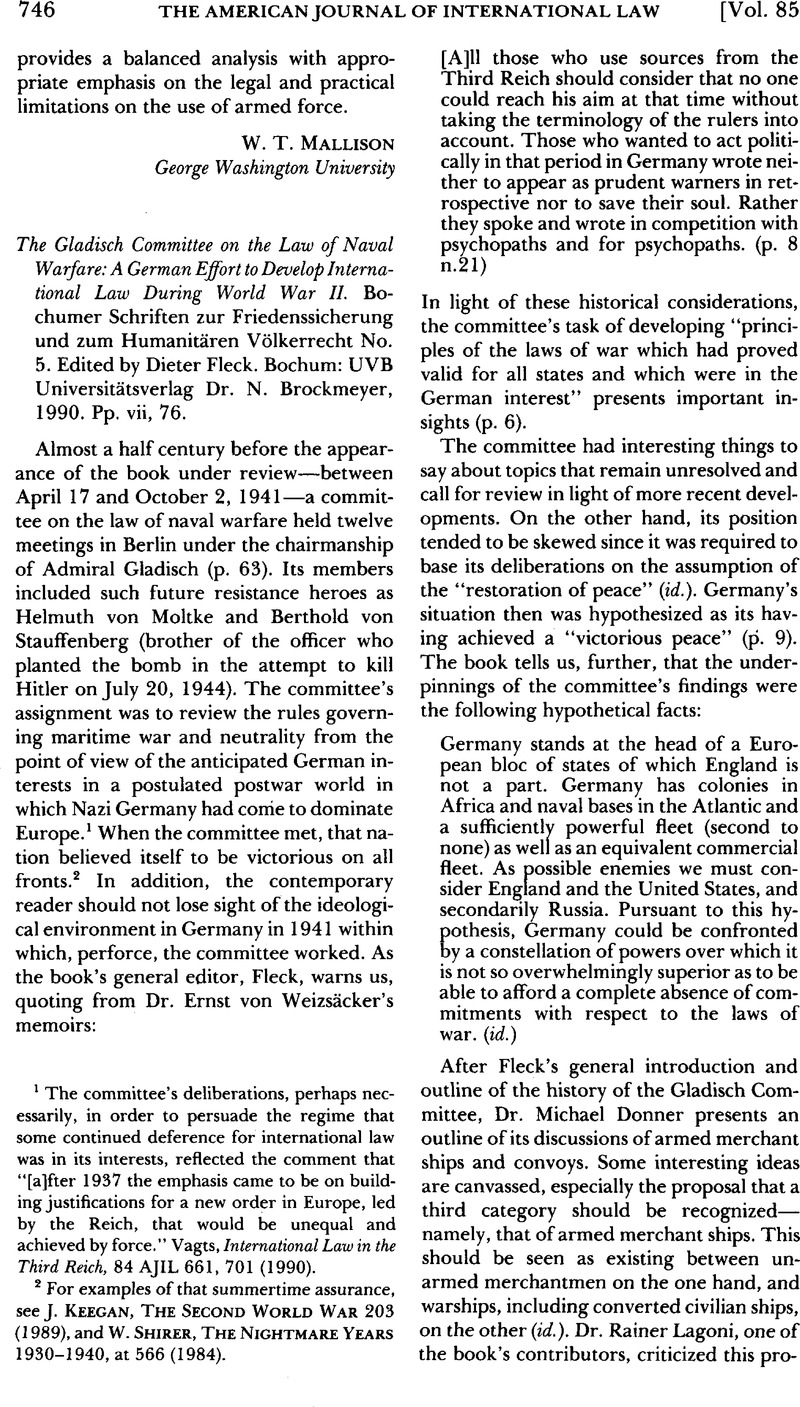No CrossRef data available.
Article contents
The Gladisch Committee on the Law of Naval Warfare: A German Effort to Develop International Law During World War II. Bochumer Schriften zur Friedenssicherung und zum Humanitären Völkerrecht No. 5. Edited by Dieter Fleck. Bochum: UVB Universitätsverlag Dr. N. Brockmeyer, 1990. Pp. vii, 76.
Published online by Cambridge University Press: 27 February 2017
Abstract

- Type
- Book Reviews and Notes
- Information
- Copyright
- Copyright © American Society of International Law 1991
References
1 The committee’s deliberations, perhaps necessarily, in order to persuade the regime that some continued deference for international law was in its interests, reflected the comment that “[a]fter 1937 the emphasis came to be on building justifications for a new order in Europe, led by the Reich, that would be unequal and achieved by force.” Vagts, International Law in the Third Reich, 84 AJIL 661, 701 (1990).
2 For examples of that summertime assurance, see J. Keegan, The Second World War 203 (1989), and W. Shirer, The Nightmare Years 1930–1940, at 566 (1984).
3 See, e.g., H. Lauterpacht, Oppenheim’s International Law 406–07 (7th ed. 1952). Regarding taking of private property, see Article 18 of the Geneva Convention Relative to the Treatment of Prisoners of War, Aug. 12, 1949, 6 UST 3316, TIAS No. 3364, 75 UNTS 135, and Article 16 of the Geneva Convention for the Amelioration of the Condition of the Wounded and Sick in Armed Forces in the Field, Aug. 12, 1949, 6 UST 3114, TIAS No. 3362, 75 UNTS 31. See also 2 Pitt Cobbett’s Leading Cases on International Law (War & Neutrality) 268 (5th ed. W. Walker 1937), where the clear-cut distinction is made regarding relevance of booty to land warfare and its nonrelevance, in terms at least of Anglo-American application, to maritime warfare. It is, perhaps, significant that neither the U.S. Navy’s Commander’s Handbook on the Law of Naval Operations (N.W.P.-9,1987), nor its Annotated Supplement to the Commander’s Handbook on the Law of Naval Operations (N.W.P.-9 (Rev. A) FMFM 1–10, 1989), makes any mention of booty. On the other hand, see La Dictionnaire de la Terminology du Droit International (“Dictionnaire Basdevant”) 97 (1960). This authoritative dictionary seems to say that what is recognized in Anglo-American maritime law as giving rise to an automatic transfer of title over a public ship is “butin.” Be that as it may, “butin” seems far more circumscribed than “booty,” as perceived by at least a number of the Gladisch Committee’s members.
4 See, e.g., Lord Stowell in The Felicity, 2 Dods. 381, 165 Eng. Rep. 1520 (Adm. 1819). See also The Flad Oyen, 1 C. Rob. 135, 165 Eng. Rep. 124 (Adm. 1799). See also, for example, 2 Lauterpacht’s Oppenheim, supra note 3, at 376, where that eminent commentator wrote: “[T]he capture of a private enemy vessel has to be confirmed by a Prize Court, and … it is only through its adjudication that the vessel becomes finally appropriated.”
5 Presumably, counsel for Admiral Doenitz at Nuremberg would argue in favor of this extensive view. See 18 Trial of the Major War Criminals Before the International Military Tribunal 312, 319 (1946).
6 Oct. 18, 1907, 36 Stat. 2332, TS No. 541, 1 Bevans 669.
7 See, e.g., 2 D. O’Connell, The International Law of the Sea 1137 (I. Shearer ed. 1984).
8 See announcements by the British Government: (1) Maritime Exclusion Zone, Apr. 12, 1982, 53 Brit. Y.B. Int’l L. 539 (1982); (2) “The Defensive Bubble,” Apr. 23, 1982, id. at 540; and (3) Total Exclusion Zone, Apr. 28, 1982, id. at 542. Argentina responded with the proclamation of exclusion zones.
9 Contrast the Argentinean bombing of the neutral Hercules (“U.S. interest” Liberian-flag tanker) as reflected in Argentine Republic v. Amerada Hess Shipping Corp., 109 S.Ct. 683 (1989).
10 1936 London Proces-Verbal Relating to the Rules of Submarine Warfare Set Forth in the Treaty of London of 22 April, 1930, Nov. 6, 1936, 173 LNTS 353.
11 Quoted from A. Mahan, Sea Power in its Relation to the War of 1812, at 144(1905).
12 E. Potter & C. Nimitz, Sea Power: A Naval History 111 (1960).
13 A. de Zayas, The Wehrmacht War Crimes Bureau 1939–1945, at 271 (1989).
14 Id.
15 For a critical review of Nazi doctrine and international law, see Vagts, supra note 1, at 682–701.




